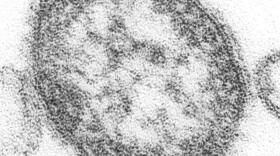Nestled among the Starbucks and CVS pharmacies on Greenfield Road and Ten Mile in Southfield and Oak Park are clusters of Orthodox synagogues, and Hebrew schools.
There are delis and other other Jewish-owned businesses.
So it sure seems like the Israeli citizen, who was visiting after catching measles in New York, did his best to visit a lot of them, including a kosher grocery store, a yeshiva, and Congregation Yagdil Torah, where I meet David Shapero.
"I generally study here in the mornings," says Shapero. "And I was studying here on Tuesday, and there was somebody I didn't recognize, nearby, who was coughing his head off."
Shapero says it's not unusual to see a stranger at the synagogue; there's a Jewish hospitality house right across the street that welcomes people from all over the world. Shapiro didn't want to be rude.
"Well, after a minute or two, when I saw the coughing was incessant, I picked up with the fellow that I was studying with and we moved a few tables away, so that I thought I'd be out of range," he says.
Turns out, that stranger was the one with measles. County health officials called the synagogue a couple of days later.
Measles is extremely contagious. You can catch it two hours after an infected person has left a room. But Shapero had measles when he was four, so he thinks he'll be okay.
Dr. Gary Ross of Beaumont Hospital is also a member of this synagogue. He says of course there are Orthodox Jews living here who aren't vaccinated, and who don't vaccinate their kids. But "the vast majority of our community in terms of the Orthodox synagogues are vaccinated," he says.
Ross found out about the measles case the way virtually every Orthodox Jew in the community did. A series of text messages and emails sent by synagogues and schools spread through the community in just a few hours.
Dr. Russell Faust is Medical Director for the Oakland County Health Division. He says because of this communication network, it's been pretty easy to get crucial information to Orthodox Jews. First off:
"People who are not vaccinated have at least a 95% chance if they are exposed of becoming infected with measles," Faust says. "This is an incredibly efficient virus."
A couple of other things: if you are not vaccinated and you get a measles vaccine within 72 hours of being exposed, it could help you stay healthy.
Also, if you're a high risk person who shouldn't get a vaccine, you can be treated within six days of exposure with immune globulin.
Faust is more worried about the people in this area who aren't Orthodox Jews.
"We have a sense we're waiting for the other shoe to drop right now," says Faust. "Just because of the number of potential exposures, and of course we have no idea how many of those people potentially exposed are unvaccinated."
There may be reason to worry. Oakland County has one of the lowest vaccination rates in Michigan. We'll know more in a week or two. The Centers for Disease Control says measles symptoms generally show up about seven to 14 days after a person is infected.
Update, Friday, March 22:
The Michigan Department of Health and Human Services has confirmed four additional measles cases in Oakland County. The department says three other cases are also currently under investigation.
People may have been exposed in Detroit and the suburbs of Oak Park, Southfield and Berkley , including at a synagogue and grocery stores.
MDHHS is urging Michigan residents to get vaccinated against the measles.












